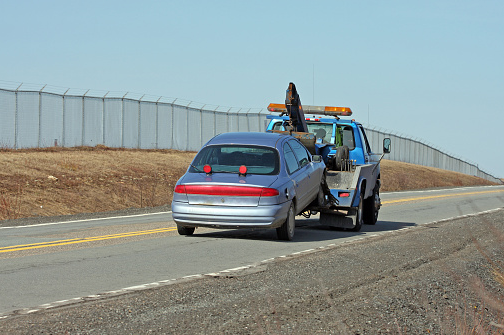Towing a Car
A damaged 1200-kg car is being towed by a truck. Neglecting the friction, air drag, and rolling resistance, determine the extra power required (a) for constant velocity on a level road, (b) for constant velocity of 50 km/h on a 30 degree (from horizontal) uphill road, and (c) to accelerate on a level road from stop to 90 km/h in 12 seconds.

Expand Hint
The power due to potential energy:
$$$\dot{W}_{g}=mg(z_{2}-z_{1})/\Delta t$$$
where
$$m$$
is the mass,
$$g$$
is the acceleration due to gravity,
$$\Delta z$$
is the change in height, and
$$\Delta t$$
is the change in time.
Hint 2
The power from kinetic energy:
$$$\dot{W}_{a}=\frac{1}{2}m(V_{2}^{2}-V_{1}^{2})/\Delta t$$$
where
$$m$$
is the mass,
$$V$$
is the velocity, and
$$\Delta t$$
is the change in time.
The total power required for each case is the sum of the rates of changes in potential and kinetic energies. That is:
$$$\dot{W}_{total}=\dot{W}_{a}+\dot{W}_{g}$$$
where
$$\dot{W}_a$$
is the power from kinetic energy, and
$$\dot{W}_g$$
is the power from potential energy.
(a) Zero.
(b)
$$\dot{W}_{a}=0$$
. Thus,
$$$\dot{W}_{total}=\dot{W}_{g}=mg(z_{2}-z_{1})/\Delta t=mg\frac{\Delta z}{\Delta t}=mgV_{2}=mgVsin(30^{\circ})$$$
where
$$m$$
is the mass,
$$g$$
is the acceleration due to gravity,
$$\Delta z$$
is the change in height,
$$\Delta t$$
is the change in time,
$$V$$
is the velocity. Thus, the extra power on an upward hill is:
$$$=(1200kg)(9.81m/s^2)(\frac{50,000m}{3600s})(\frac{1kJ/kg}{1000m^2/s^2})(0.5)=81.7\:kW$$$
(c)
$$\dot{W}_{g}=0$$
. Thus,
$$$\dot{W}_{total}=\dot{W}_{a}=\frac{1}{2}m(V_{2}^{2}-V_{1}^{2})/\Delta t$$$
where
$$m$$
is the mass,
$$V$$
is the velocity, and
$$\Delta t$$
is the change in time. Thus, the extra power to accelerate from rest is:
$$$=\frac{1}{2}(1200kg)[(\frac{90,000m}{3600s})^{2}-0](\frac{1kJ/kg}{1000m^2/s^2})/(12s)=31.3\:kW$$$
(a) Zero
(b) 81.7 kW
(c) 31.3 kW
Time Analysis
See how quickly you looked at the hint, solution, and answer. This is important for making sure you will finish the FE Exam in time.- Hint: Not clicked
- Solution: Not clicked
- Answer: Not clicked